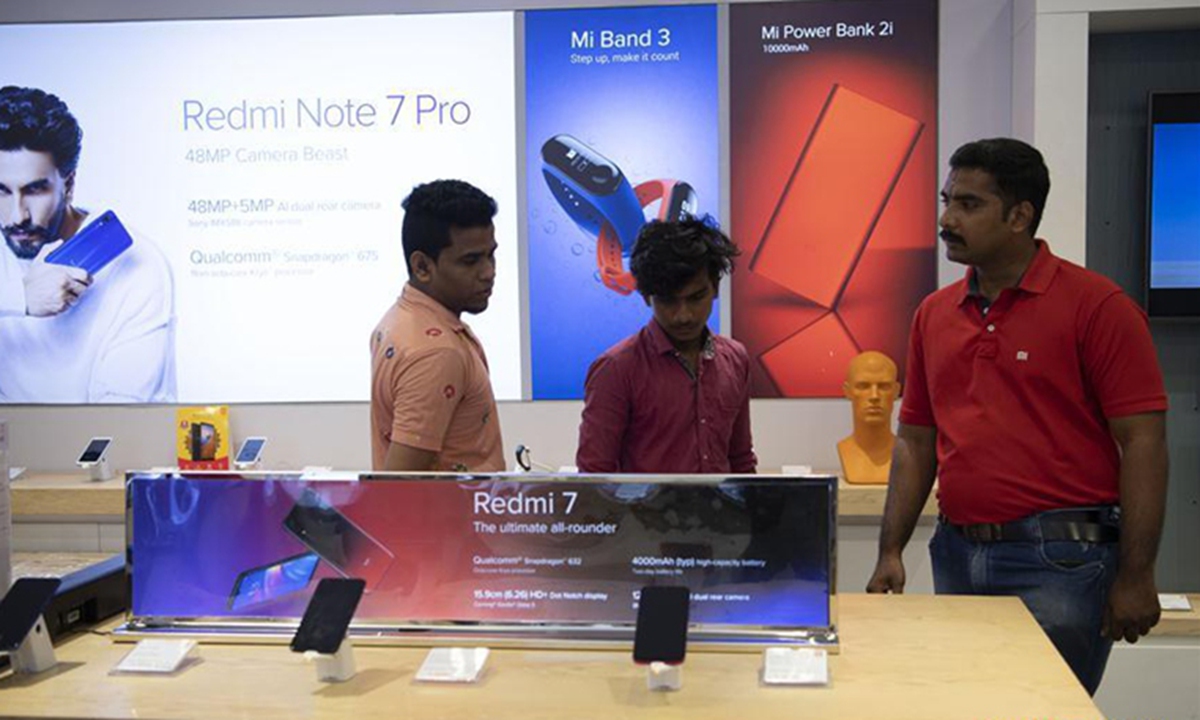Chinese smartphones dominate Indian market despite new barriers
By Chu Daye Source: Global Times Published: 2020/11/26 19:58:40

Customers are seen at a store of Chinese technology company Xiaomi in Chennai, India. Photo: Xinhua
Chinese smartphone brands continue to generate huge revenues in Indian market, which they dominate despite the Indian government's move to set up additional barriers and make cross-border flow of goods even more difficult.
Chinese analysts said the situation showed that Indian consumers are voting with their wallets, despite government intervention and pressure from some local nationalist groups to ditch Chinese products for domestically made alternatives.
The Indian government raised the barriers against imports of goods from China after a deadly border clash in June.
Digital device makers are required by the Bureau of Indian Standards, the Indian quality control agency, to submit additional documents to get customs clearance.
Smartwatch imports for companies including Xiaomi and Oppo, and some of the newest models from US-based Apple Inc including the China-made iPhone 12, are among those facing import hurdles at the airport, according to a Reuters report on Thursday.
As many as 30,000 TVs made by Xiaomi have also fallen victim to the delaying tactic of the Indian government.
However, Chinese brands continued to dominate the Indian market in the third quarter, with four Chinese brands accounting for 73 percent of all smartphones sold, according to a Canalys report released in November. That figure was only 2.0 percentage points lower than in the second quarter.
Xiaomi led other brands with a 26-percent market share, trailed by South Korea's Samsung, which accounted for 20 percent — the only non-Chinese brand among the top five vendors.
Chinese smartphone maker Xiaomi, which generates most of its revenues outside the Chinese mainland market from sales in India and Europe, on Tuesday reported record high revenue from overseas markets of 39.8 billion yuan ($6.05 billion) in the third quarter, up 52.1 percent year-on-year.
"Regardless of changing geopolitics and external factors, we remain committed to bringing innovation to everyone," a source close to Xiaomi told the Global Times on Wednesday.
On Thursday, Chinese Foreign Ministry spokesperson Zhao Lijian urged the Indian government to immediately correct its discriminatory actions against Chinese goods so that larger damage can be avoided in what is a mutually beneficial trade and investment relationship.
Tian Guangqiang, assistant research fellow with the National Institute of International Strategy at the Chinese Academy of Social Sciences, said that as the Indian economy has been hit badly by the COVID-19 pandemic due to ineffective control measures, Indian consumers are "only making a reasonable decision" to purchase Chinese smartphones and other consumer electronics -- gadgets that are of great use during the lockdowns.
"India is on the receiving end in the China-India trade relationship. Chinese goods with their good cost performance cannot be replaced by India's locally produced products or those from a third country," Tian told the Global Times on Thursday.
"The situation shows that the Indian government's barriers cannot prevent its consumers from buying Chinese devices," Tian said.
Posted in: INDUSTRIES